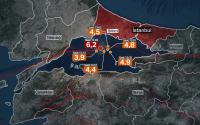Common Dreams / Published on Saturday, August 18, 2007 by Associated PressJay Reeves
One reactor at a north Alabama nuclear plant was idle Friday and two others operated at reduced power because of the record-breaking heat wave, an outage that an industry watchdog said could be a sign of trouble for nuclear energy in a warming climate.
The Tennessee Valley Authority said it shut down the Unit 2 reactor at Browns Ferry Nuclear Plant and scaled back operations 25 percent at the plant’s other two reactors because of overheated water in the Tennessee River, which is used to cool the plant.
“This all comes down to the drought and the hot weather,” said plant spokesman Jason Huffine.
Industry watchdog David Lochbaum said the shutdown highlights a problem for nuclear power even as it is touted as environmentally friendly by President Bush, who visited Browns Ferry in June.
“This is an unforeseen impact of global warming. These plants don’t do very well in extremely hot weather,” said Lochbaum, a former Browns Ferry engineer now with the Union of Concerned Scientists in Washington.
Ken Clark, a spokesman with the Nuclear Regulatory Commission in Atlanta, said such shutdowns were rare but had occurred elsewhere.
Air temperatures soared to 105 degrees in north Alabama Thursday afternoon. Around that time, the temperature of the water downstream from the plant reached 90 degrees, the limit set by environmental regulators.
TVA spokesman John Moulton said operations were scaled back because of the high temperature of the water. Unit 2 was shut down, and Units 1 and 3 were reduced to 75 percent of their capacity.
Cutting back on power production reduces the temperature of the water discharged by the plant into the river, and that helps keep the river cooler, said Moulton.
“We did the environmentally responsible thing and limited operations,” said Huffine. Units 1 and 3 were being taken back to near full power on Friday to meet power demand, he said, but Unit 2 remained idle.
Lochbaum said Browns Ferry can’t efficiently turn water into steam or return it to its liquid form if its temperature is above 90 degrees.
“There’s not a reactor safety issue, there’s an economic issue,” he said. “These plants were designed for cooler temperatures. If something drives those up — whether it’s global warming or whatever — you have to account for that.”
The U.N. Intergovernmental Panel on Climate Change concluded earlier this year that global temperatures could rise as much as 11 degrees Fahrenheit by 2100 and that climate change already is affecting animal and plant life.
A TVA study from 2005 predicted that operations at Browns Ferry would have to be scaled back once every three to five years and could be completely shut down because of overheated discharge water.
Alabama has had 11 straight days with triple-digit temperatures, breaking records that dated back to 1881 in some areas.
Browns Ferry is located about 95 miles north of Birmingham. Bush visited the plant in June after operators restarted Unit 1, marking the first time in 22 years that all three of its reactors were on line at the time time. They had been shut down amid safety problems.






